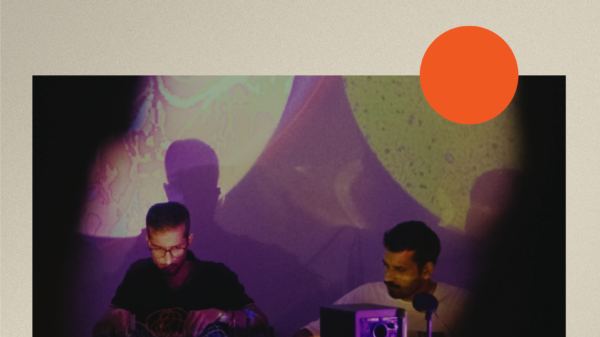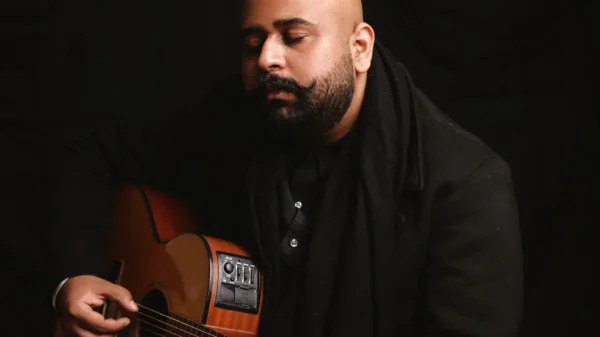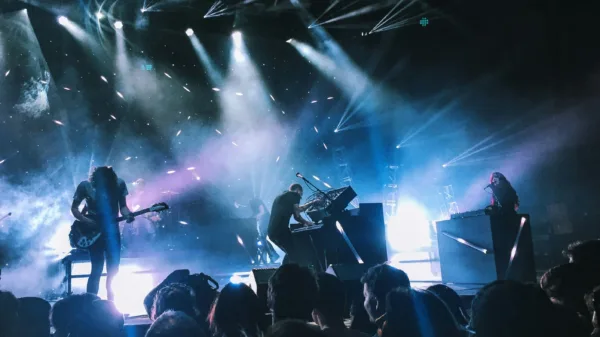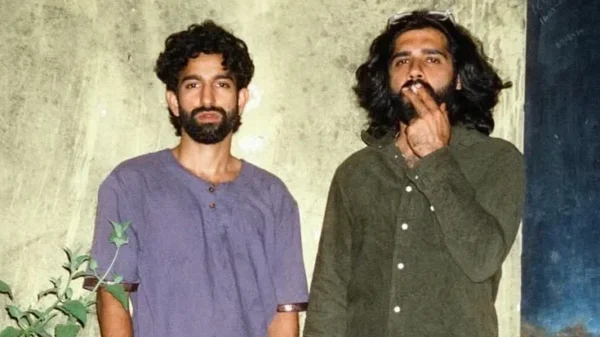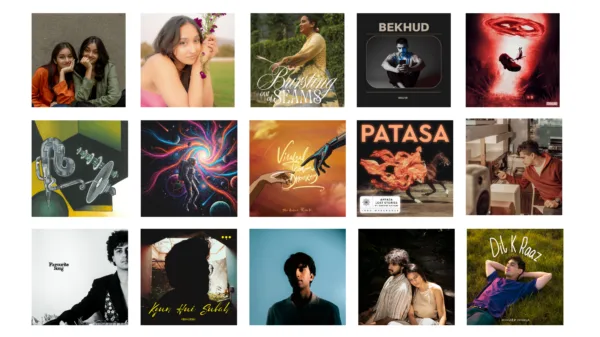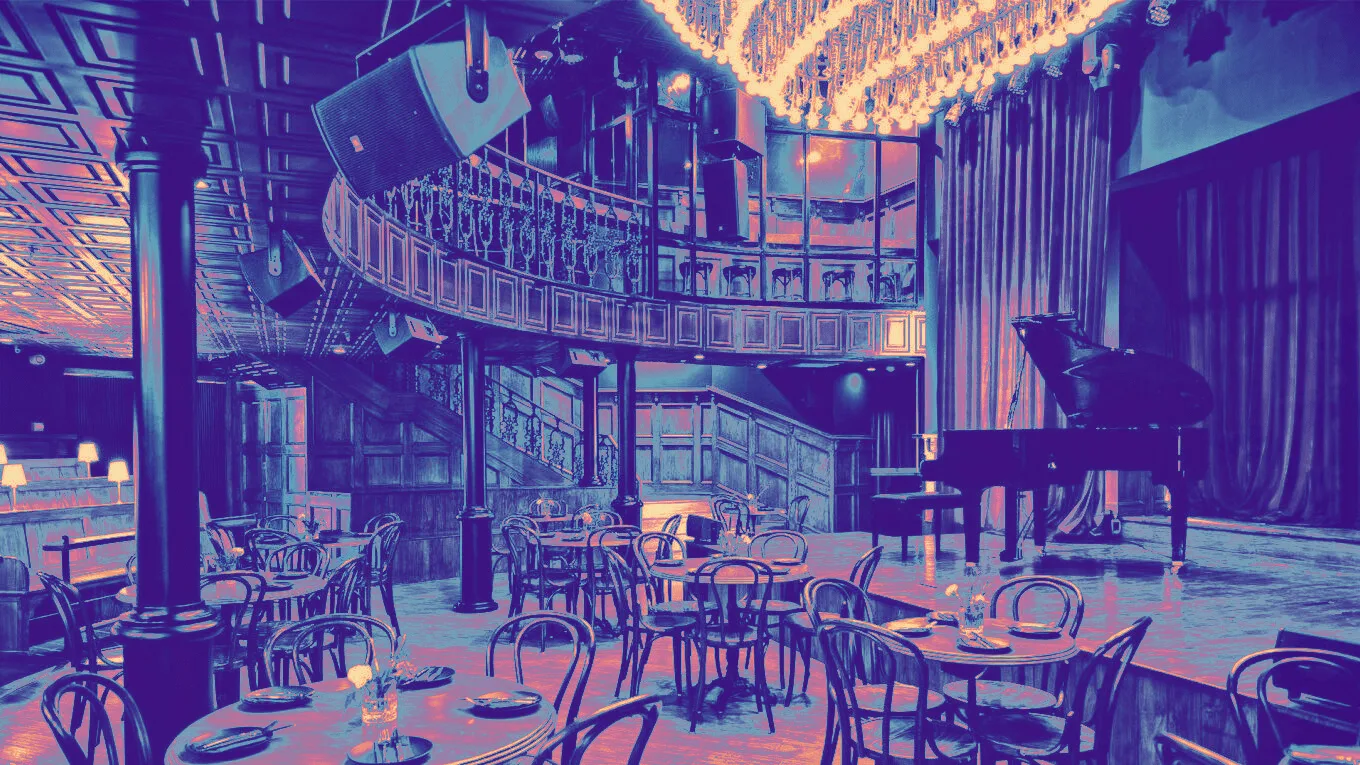It is difficult to understand the configurations of a city’s music scene, especially if you do not belong to it, and when the metropolis in question in Delhi – with its soundscape so diverse that it is almost unsettling that it could all exist within the bounds of one union territory. Over the last three years, I have had the luck of being bestowed the position of an observer in the right rooms at the right time, watching the most beautiful, eccentric performances with categorically different histories and cultural anthropologies. Reducing oneself to a fly on the wall does not always sound palatable, but it is tremendously satiating when you witness the unfolding of the mechanics of the lives of others, and the way they endow meaning to their own through their art.
One of the foregrounding conclusions I had made through my time in the capital is how young the pool of creatives in the field of music were, and the amount of sheer apparent dedication that they were putting in, in realizing their visions and breaking their way out of anonymity. Currently, Delhi has a burgeoning hip-hop scene, an intensive network of classical musicians, both Indian and Western, institutes of formal training, and its unique feature : the circuit of Delhi University’s very own music societies. There are also hotspots of venues, which form viable places for both artists and fans to access each other, and establish themselves as “serious” craftsmen.
To make a little more sense of how the Delhi scene has been functioning as of late, I spoke to 5 incredible musicians and 2 esteemed venue owners – who shed light on the workings of their own artistry and how they locate themselves in the contours of this teeming topography.
ARJUN RANA, 19
Arjun Rana caught my eye once I came across his incredibly smart promos for his now-released single Kya Mai Sundar Lag Raha Hu? Using eccentric, shot-at-home, self-edited Instagram reels where he utilized the characteristically esoteric brand of Gen-Z humor along with segments of his own single, he managed to create attention-grabbing teasers that cleverly came together to construct a perceptible identity for himself as an artist, while also remaining intelligible to his audience. Rana had his mom’s guitar lying at home, mostly unused, and had a lot of free time on his hands during the lockdown. While he had spent his time in school, singing in the choir and playing for the school band, it was the pandemic-induced house-arrest that actually gave him the space to actually think about music on more creative and “serious” terms. “The reason I started to pursue a music career was primarily because I wanted to have something that I could control by myself, just something that I am doing on my own — not something that someone else is pushing me towards, or helping me do,” he said.

Rana has an interesting catalog of music already. In 2021, he released his first single, love went away, which ended up being played on 93.05 Red FM. Since then, he has released a total of four singles and is in the process of figuring out the semantics of music making and promoting it. The artist’s first encounter with Delhi’s music scene happened at a Peter Cat Recording Co. show that had happened last year, as a part of the India Cocktail Weekend. After having what he calls one of the “greatest experiences of his life”, he started delving further into the city’s current musical landscape. It had dawned upon him that the people in the scene were people who were his age or slightly older, doing things that appeared aspirable to him, as he said, “I did not have any real experience in hip-hop, but I did know that I wanted my songs to reach their audiences. I wanted to prove that I could be at the same level as them, or even better than them.”
An interesting thing that Rana told me about was him making a Hinge account to promote and improve his music. Creating an advertisement equivalent on his profile, he would send a demo of his songs to people who sent him likes, following which he would ask for their feedback and ways to fill up the rooms for improvement. Through this, he managed to find someone interesting who had reviewed his music, – “She turned out to be someone who worked for a management agency for artists, and since then, I have started working with the company to promote my music. Ever since, I have seen substantial progress for myself when it comes to breaking into the Delhi music circuit, meeting the right people, etc.”

There has been a tangibly visible shift in Rana’s music. From more acoustic, guitar heavy, indie-pop tonalities, the acknowledged gravitation to more DHH-aligned, Hindustani-music influenced elements had been as much external as it was internal. While he had done countless open mics, and shows, it mostly involved him playing his guitar and singing – and it eventually bored him. He had realized that it was more of a playground of similar sounding performances, with little experimentation beyond guitar-heavy singing, and he wanted to do things differently. On being asked if the Delhi scene has felt limiting to him, he mentioned that the feelings of being an outsider overpower the sense of limitation. As an artist looking to network, he primarily uses Instagram to connect to people who have been working towards establishing themselves in similar ways, and he has noticed the pre-existing circle of artists who know each other, and primarily work with each other. That, he said, was something he found difficult to break into.
Rana plans to release 5 songs as parts of his EP, Ranisa, which he expects shall be out in composite form by September. His upcoming single features producer Akarsh, reputed in the DHH scene for his collaborations with the likes of Nanku. “The EP is kind of like a play, with five acts to it. In the music video that he is set to release for Kya Mai Sundar Lag Raha Hu, is an introduction to the protagonists of the play,” he said.
When I asked if he felt the pressure of making the content that he does, the singer-songwriter mentioned a statement that has become foundational in his process of making music, which further extends into his self image : “I have it in my lockscreen, I have written it on my wall, and I have kept it as my Spotify bio. I just kept saying to myself “kya farq padhta hai, kya farq padhta hai, kya farq padhta hai”. Even if people think that one thing I do is wrong, one of my videos is bad – that should not stop me from doing what I want to. Even if people find it weird, even if people find the videos that I make unserious, why not make the thing that I want to, anyway?”
SHOMUDRO GHOSH, 19
There is an odd sense of skepticism that surrounds any form of formal training associated with the arts — perhaps it is a product of late-stage capitalism : the discomfiting judgements that people derive from the sight of someone so intrinsically certain of their craft that they choose to devote themselves so completely, diving headfirst into their passions and the imposition of the same on these people do not constitute anything completely unheard of. However, ever so often, one has the opportunity to come across artists who disprove these verdicts by their sheer commitment, laborious usage of their time and an awareness of the enviable faculties they have access to, and an intrinsic respect for the same. Shomudro Ghosh, who is pursuing a BA in Contemporary Music Performance at Global Music Institute is one of those people. He currently plays the piano actively, along with percussion instruments like the drums, congos, bongos, cajon, djembe etc. Coming from a family of musicians, he was encouraged into music very early on into his childhood. Ghosh was progressing well in school, leading the band, and being a stagehand associated with multiple reputed establishments— which had contributed to boosting his confidence steadily over the years. However, transitioning into music school had been a cultural shock of sorts : “It was a big blow on my confidence. While I thought I came into GMI as a very prepared pianist, I was way below everybody else. It does take a toll on your mental health, especially when you are in a field that is unstable, and when it is going to be your only source of income. After all, I am doing a degree here, I am not in any other college’s music society. If I cannot succeed, what am I supposed to do?— that was a thought that had consistently bothered me.”
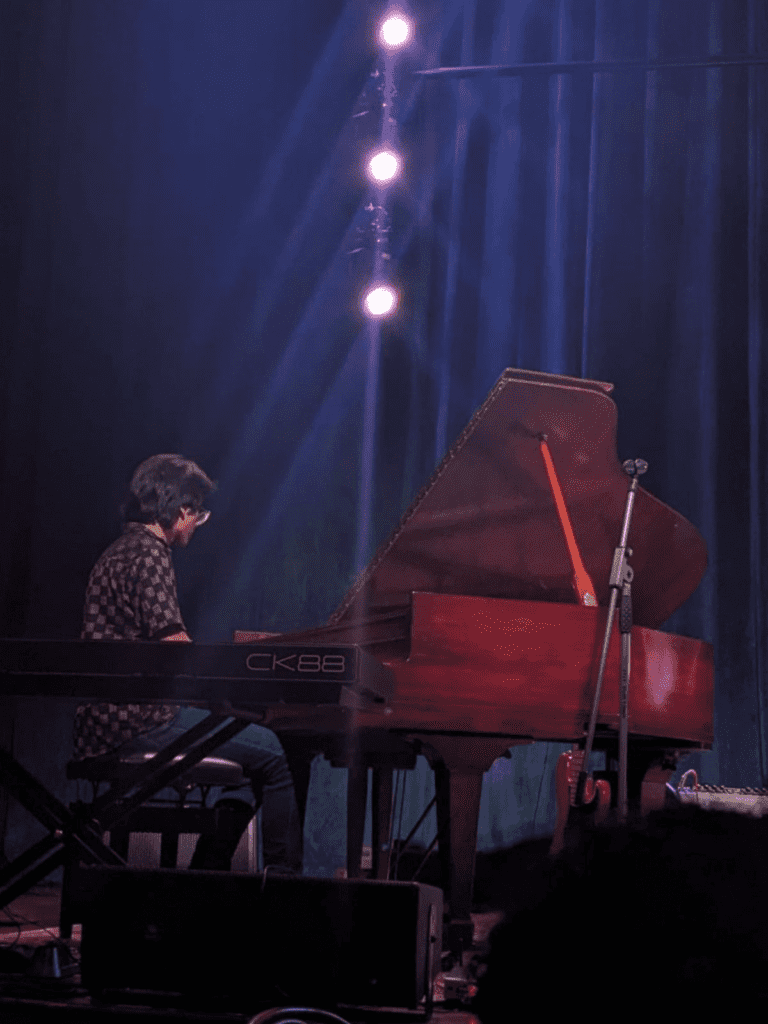
According to Ghosh, there are two sections to the Delhi music scene : there is the commercial music space which is more financially lucrative, and there is the more “elite” counterpart which has jazz, fusion, indie, and other more formal and experimental units of musical performance. The latter space could be a little more difficult to break into, in his opinion, considering jazz is the most prominent and prestigious genre in the alternative music space.
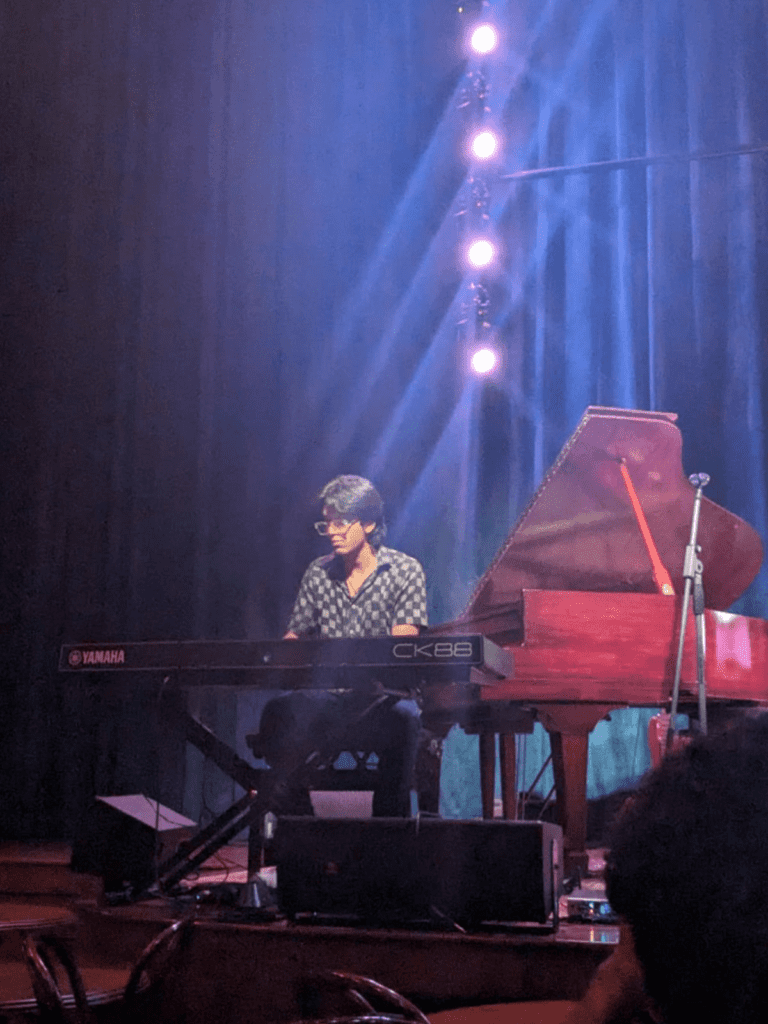
The pianist has worked as an instrumentalist/accompanist on several occasions, been a part of a fusion band in the past, and currently plays for a primarily rock-n’-roll band called The Orion’s Belt. On being asked about his experience as an accompanist and whether it is particularly limiting, he responded “Most of my gigs have been with a specific set of people. I have been lucky to have been chosen by them. Being an accompanist does not make you any less, there are certain things that I might know, and there are specific things that the vocalist might know. We have to rely on each other’s information to make the situation the best it can be. It has never been too much of a daunting or a negative experience. As an instrumentalist, you are always included and your opinion is always valued – you have to give opinions, because nothing is going to progress without them. After all, it is a collective experience being in a band. The primary difference that might be there is that the singer gets the most spotlight because they are center-stage, and people are looking at them. That does not make their contribution more than mine, or my contribution less than theirs.”
Ghosh believes that it is too early in his career to decide which space he is going to entrench himself into : “The thing is, the commercial space has its advantage : obviously it is the money. The biggest what-if for every musician, as a student at least, is will it be feasible in the future? The money that music students are paying would be very difficult to make back when we are working musicians. The ROI of being a music student is extremely low. If you are money driven, you should definitely venture into the commercial music space. I do think about it sometimes, though – because the fusion band that I was playing with is a commercial one. So, they play wedding gigs, party gigs, and those are technically commercial gigs where we played mainstream pop songs. I haven’t actually had too many opportunities to play gigs that align with the field that I am studying in. At this point, I think if I am gaining exposure, name, and money at the same time, I might as well take those opportunities. After all, it is my career, and I have to make it.”
Shomudro Ghosh can also be found on : https://www.instagram.com/shomudroo/
SWASTIKA THAKUR, 21
A few months ago, I saw Swastika Thakur perform at one of Delhi University’s several inter-collegiate music fests. It is very rare to be able to tell someone’s sheer sense of determination and commitment to detail from just one performance, moreso if it is amidst a slew of other incredible ones. However, Thakur’s act was deeply impressive, and almost every member of the audience could pronounce in the way she conducted herself that she was so deeply immersed into the sound of the music that she was delivering on stage, that she was one of those people, never fumbling her pitch or going off key, — the kind who are in it to win it. She had won, of course, in line with her achievements during this year’s college fest season, where she has managed to rise to the top of the leaderboard, that is, if anyone is keeping scores. A Physics major from Sri Venkateswara College, she is also the President of its Western Music Society, Crescendo and has been trained in Hindustani classical music. Thakur has also released a new single, Leher, with collaborator Hemang Duggal which is described as follows : “Leher is an evocative Indie Hindi Electronica song that masterfully intertwines lyrical depth with innovative soundscapes. Written, composed, produced and performed by Hemang, with beautiful vocals by Swastika, this track delves into the profound metaphor of waves to explore loneliness, introspection, and the struggle to express one’s emotions.”
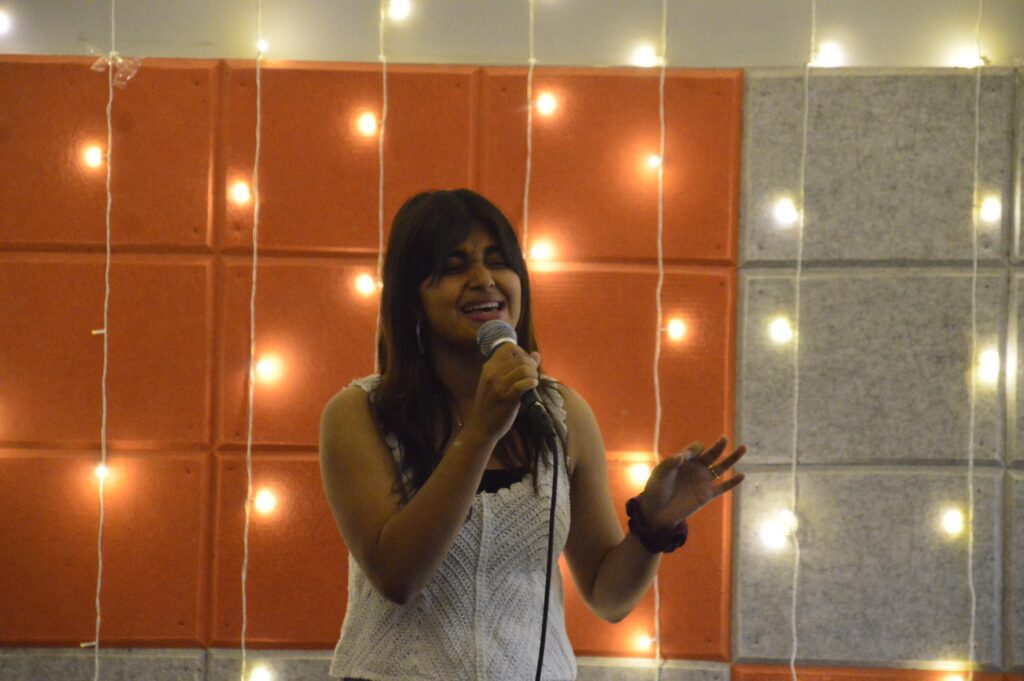
On asking her about her experience as President in one of the most successful performers in the Delhi music circuit, she said that it has been a learning experience, although it did not give her any brownie points in credibility, much opposed to what would be the popular belief associated with position-holders in the circuit. What is crucial to being in a Western music society in the Delhi (University) music circuit is to be tremendous at acapella, and if you are president, it also entails building your composition skills. Thakur emphasized that her tenure and time in Crescendo enabled her to learn things like piece-making, strengthened her leadership skills, and most importantly, sharpened her knowledge of music theory. On being asked about the competition season that is characteristic to the fest season in colleges, she told me that it does get stressful, but at the same time – you do get to see the enthusiastic participation and the diversity in the creativity of multiple societies and their performances. This also translates into gigs and open mic events which are currently teeming in many parts in Delhi. Something that I was inclined to ask, after having been in the audience in several of these events, was about the wide range in the quality of performances when there is no filtration process in such events — and whether it is tedious for performers like her. The singer pointed out to me something that I had been, quite naively, ignorant of. These open mics and events serve as strong grounds for performers who are just starting out, and need to gain experience with live performance. It also helps them assess where they stand in terms of skill-sets, and can seek out advice from artist counterparts who have the upper hand of experience on them. There are, obviously, more aspirable venues in the city where the more seasoned have greater chances performing in considering the more selective criteria when it comes to performers, Depot48 and The Piano Man, in particular.
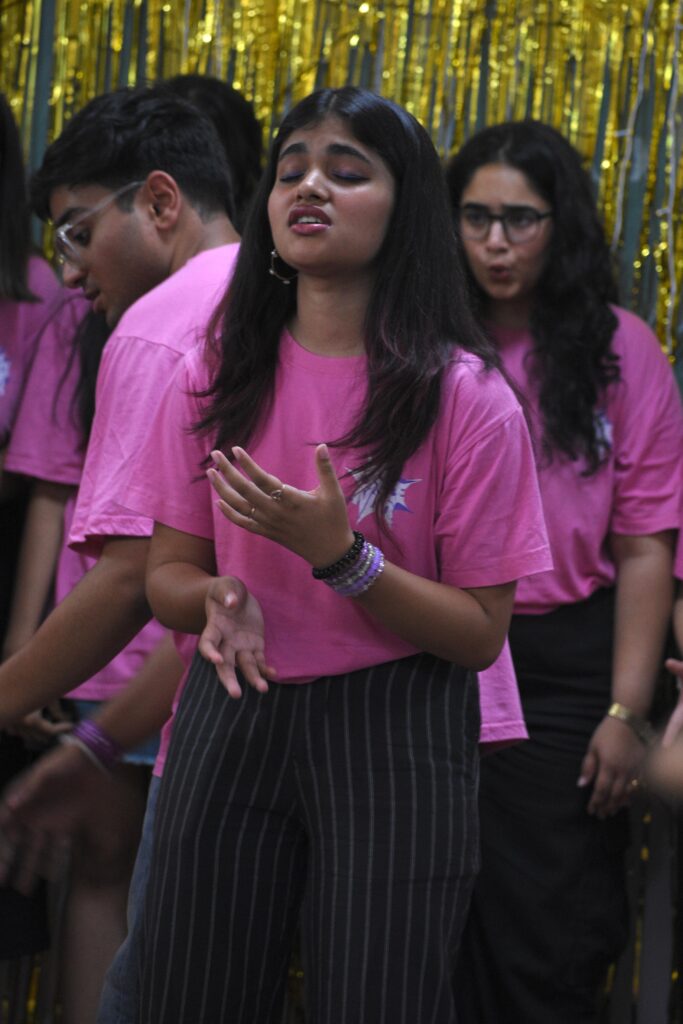
Thakur has not yet had any interactions with labels, and managements, as of yet. She is also deeply aware of the fact that having a contract with a business establishment also means that there is some level of encroachment when it comes to having creative liberties. Delhi, she believes, does offer a number of opportunities when it comes to being an independent artist — although if someone prefers to transition into the commercial, film music space, Mumbai would be a more ideal location. With the arrival of Spotify, and just a general rising level of interest in indie artists at the moment — now is a great time to stick to one’s vision of being an independent musician. Thakur, for now, intends to continue with honing her incredible vocals — and eventually delve deep into the waters of songwriting, turning herself into a powerhouse artist, which she already is en route to becoming.
TANVI VISWANATHAN, 21
While forming a perspective of the Delhi music scene, it also became imperative for me to talk to someone who would give me some direction when it came to the Indian classical front – considering how widespread that network is, in the metropolis, with some of the most interesting and impactful acts emerging out of its crevices every moment in time. Tanvi Viswanathan, who formerly acted as the General Secretary of Dhwani, Lady Shri Ram College’s Indian Music Society, was kind enough to converse with me and give me her insight. An Economics and Computer major, Viswanathan, who is from Kerala, has been trained in Carnatic music. After coming to LSR, she has been picking up Hindustani classical, little by little.
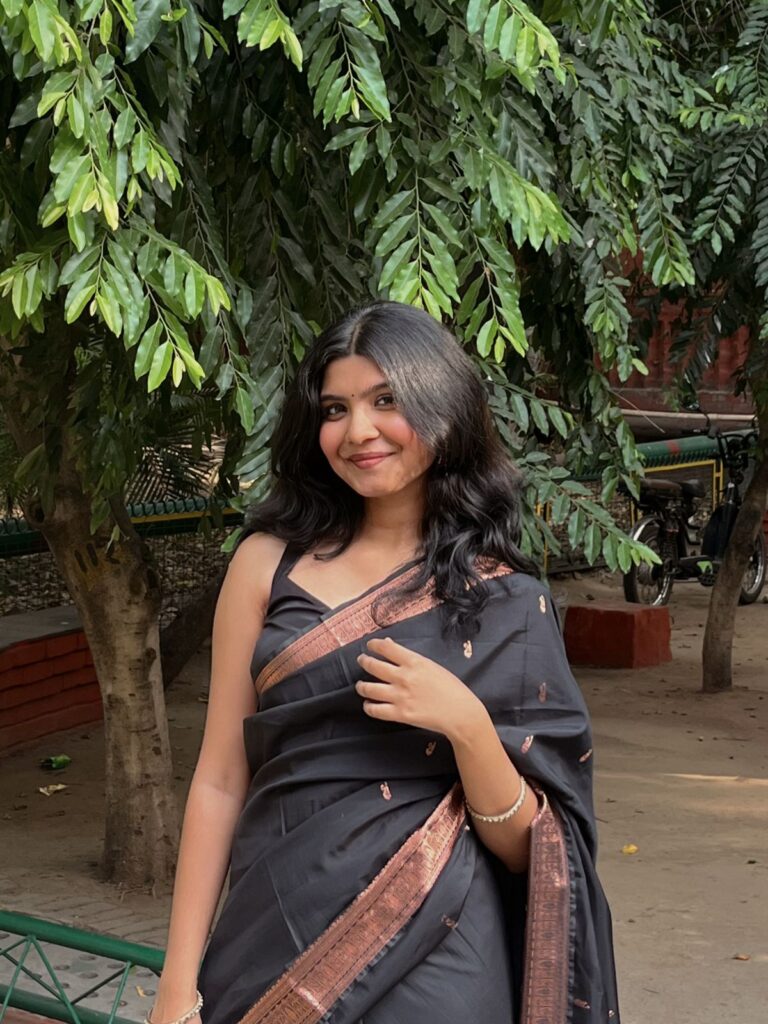
In Kerala, she said, she had a similar cultural environment when it came to fests, and had been an active participant in her school circuit. “It was not a shock, in that sense. However, I have not seen such good singers in my life. I would not say that I was envious, but I was very honored that I was allowed the opportunity to work and sing along with them. If there was a surprise, it was a pleasant one, because I was mostly awed by people,” she said.
Viswanathan also pointed something intriguing out to me. The University has its own course for Music (hons.), from which students get allocated to different colleges. The students in question devote themselves to music education for the entirety of their time. Herein emerges a disparity, because a huge chunk of students, even within the respective music societies, pursue music as something more of a recreational practice, rather than as a vocation for themselves. Even if the administration were supportive, (which it is usually not, she interjected) the difference in priorities often leads to a withdrawn sense of investment. Obviously, the lack of investment is also a reflection of the country’s education system’s infrastructural concentration on more “academic” lines – but this dispelled sort of motivation among students is also a contributing factor. Almost every college, she pointed out, has a problem with funding within the University. The Indian Music circuit is very close-knit, according to her. The individual societies do come to each others’ assistance, and the connections have led to lucrative opportunities for everyone involved. Delhi, she believes, strikes a balance between maintaining an Indian and Western music circuit — while she has friends who are active members of music societies in other states, none of them are as profoundly functional and interweaved as Delhi University’s.
The intricacy of society management is also a thing of complexity : “Being musicians, everybody has a different perspective. It is also important to remember that Indian classical music is such that it is very regionally different when it comes to training. Every state is different. This also means that there will be a number of ego clashes. If there is somebody training us, there will be 25 different counter-opinions to that. That is a downside, because sometimes, even if the majority suggests that what you’re doing is not good, you might still feel that you have been wronged. Therein lies the problem of ego clashes, however, there is no point dwelling too much over that. Besides, people in power, no matter where, are always hated. Partly because they have an edge over the others, they have access to a lot more information. With the last core council, there was some amount of tension in the society because we started imposing some rules to create a sense of discipline. Diversity in opinion is always great, but sometimes it does create some problems,” she told me.
Viswanathan has relocated to Bangalore for her current job, and wishes to stay attached with music, but not pursue it professionally full-time : “Music is my interest, my getaway. I have seen my friends struggle with music – and I have decided to not put myself through that. Music is always going to be there for me, and I am going to take any opportunity to learn that comes my way. However, I don’t want the only thing that gives me some peace of mind to be unsettled by associating money with it.”
Tanvi Viswanathan can be found on : https://www.instagram.com/tanviviv_/
NISHTHA SOOD, 23
Nishtha’s incredible work profile was recommended to me by a reliable friend, who introduced them as one of the most hardworking musicians he knew. One glance at the same, and I had known that he was infallibly accurate in his judgment, because the former’s profile was a reflection of their talent, skill, hard work, and a stunning personality. Sood wears many hats, professionally — their LinkedIn About section gives one a brief rundown of their repertoire : “I’m a musician, singer-songwriter, music educator, and vocal coach with over 15 years of music education and 3 years of teaching experience. I also have knowledge and grounding in customer service, commerce, and marketing.” Having graduated this year with an Artist Diploma in music from GMI, they also have a B.Com and a Sangeet Prabhakar degree under their belt.
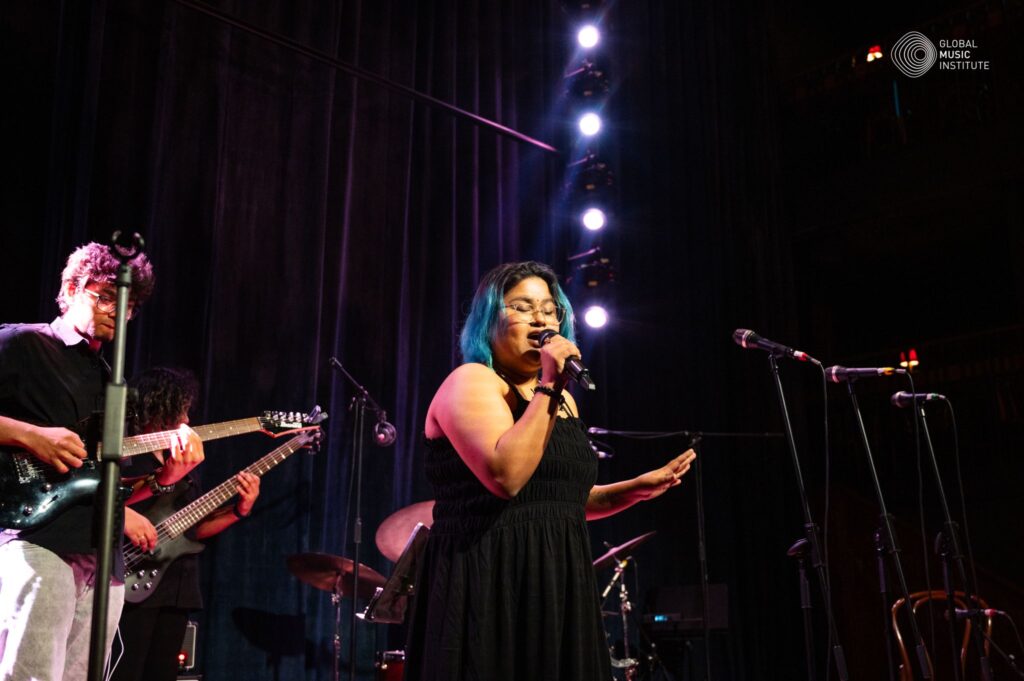
Sood highlighted the uneven allocation when it comes to investment from colleges among the different societies in Delhi University’s colleges. While the University admitted students on the basis of music quotas, they point out, most music societies did not have proper rooms for practicing during their time there. “The situation was so bad, we barely had any space to sit. The room was very small, it almost resembled a staff kitchen. They didn’t have any budget for us. Some colleges provide infrastructure and opportunities, but it is very rare and not a university–wide arrangement. I had contemporaries who were singing at extremely prestigious establishments and big venues. Nobody really teaches you how to network, you just meet people – but how do you maintain that connection, how do you land that gig? In that aspect, GMI has opened up a lot of avenues for me.” Sood is extremely candid with me in our conversation as they reveal, “I used to walk past, or stand in front of The Piano Man, in Hauz Khas and think that it was very cool and wished to perform there. Back then, I was a student of Indian classical music, and I did not know about formal music education or music schools beyond that as such, I thought it only happened abroad.” Ever since, they have taken the stage many times at The Piano Man, and even gained praise from its founder – Arjun Sagar Gupta.
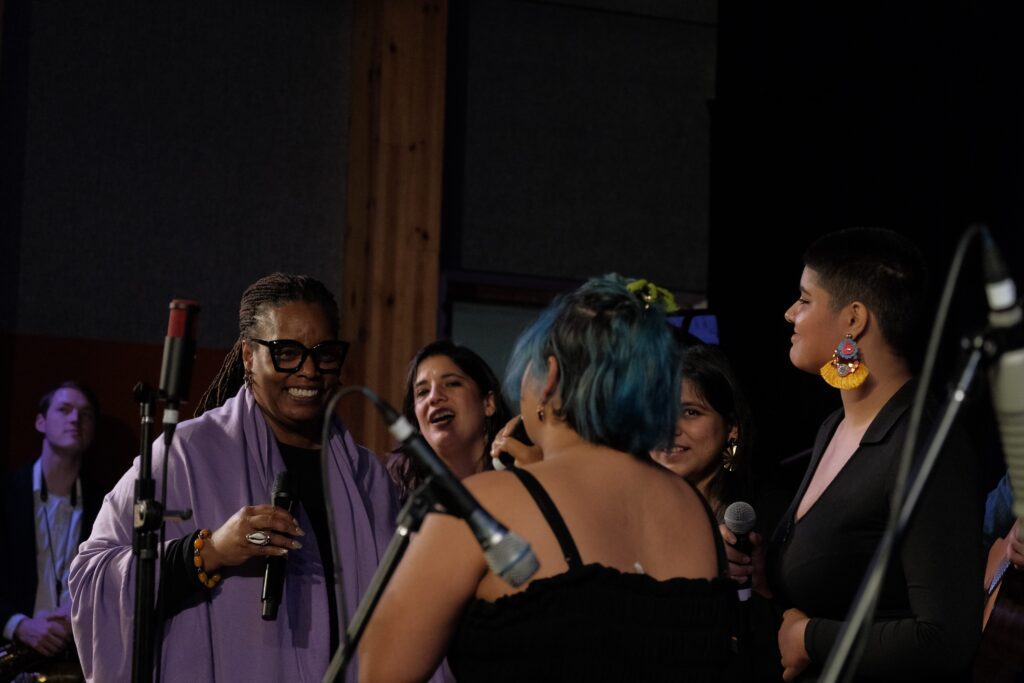
Sood also pointed out the income disparity in big-league music institutions. They are at GMI on a student loan : “I think it is moreso a societal thing, it happens at every expensive institution. I did not have a lot of time to hang around, I just went back home. I used to teach, and that is how I made my rent. I wanted to make the most of what I had invested – I did not have the funds to just sit around and have fun. I wanted to eke out the most I could from classes.” The 23 year old artist also told me that one of the most important things that they have learnt is to make sure that they should not do anything for free — working without an agreement leads to exploitation in multiple cases. From secondary accounts, they have heard that there are multiple instances where musicians have been blocked by organizers and other parties who are supposed to pay after extracting the work necessary from them. Sood has also been scammed by a producer, and heard of similar stories from her teachers at GMI and the legal counsel that they decided to work with to salvage something from the less-than-ideal situation. There also happens to be a music school in Delhi, Sood mentioned that they had learned through hearsay and decided to keep unnamed, where the authorities have decided to hire faculty who are from the affluent strata of society, and are not in immediate need of money, in order to keep their ongoing unsatisfactory schedule of payments for their employees. This seems to be a recurring thing, where there are a number of schools who do not want to properly compensate their teachers : there have been instances where Sood, who has four years of experience, and is constantly learning and imbibing more and more techniques and information to improve themself, has been put on the same pay scale as someone who has a very novice understanding of musicality.
Something that they wanted me to highlight, in the report, is the rampant existence of inappropriate behavior of male members of the music industry, where they have made passes at women, sexually assaulted them, and been discomfitingly persistent with their heinous behavior even after multiple refusals — and walked off scot-free, with little to no repercussions because of their connections and influence. While Nishtha has not encountered these instances personally, multiple close acquaintances have narrated such events where the power structures have weighed down on safety and the value of consent : “The music industry, I believe can be good, but it can be really, really cruel, if you are not smart or if you do not know how to navigate it.”
Nishtha Sood can be found on : https://www.instagram.com/nishknack.sings/
While developing this story, it became apparent to me that all these artists had at some point mentioned themselves wishing to perform at some specific venues — reputed ones which have become epicenters of the city’s musical landscape. Therefore, it was imperative for me to develop an understanding of how the founders of two of the most respected venues in Delhi viewed the student music scene, and what they have been looking for in artists over the years. Girjashanker Vohra of Depot48, and Arjun Sagar Gupta of The Piano Man,were kind enough to give me some of their valuable time to discuss a few of my questions, and their experiential insight.
ARJUN SAGAR GUPTA, THE PIANO MAN
1. You have been doing this for a really long time, and have had numerous interactions with the student music scene in Delhi. What is your general perception of the same?
The quantum of musicians in the scene playing non-commercial music has grown exponentially over the last 10 years. In addition to that, the quality of songwriting that has been coming out of this country has also skyrocketed. However, I do believe that we are very far away from where we need to be, simply because of the lack of quality musical education — we have great musical education, but it is very limited, and not accessible to everybody. Besides, there is almost no musical education available at the school level : it’s arbitrary, undefined, and unplanned. Over the next few years, you will see these things gain structure, which will result in artists getting access to musical education. This will ensure a more seamless flow of things.
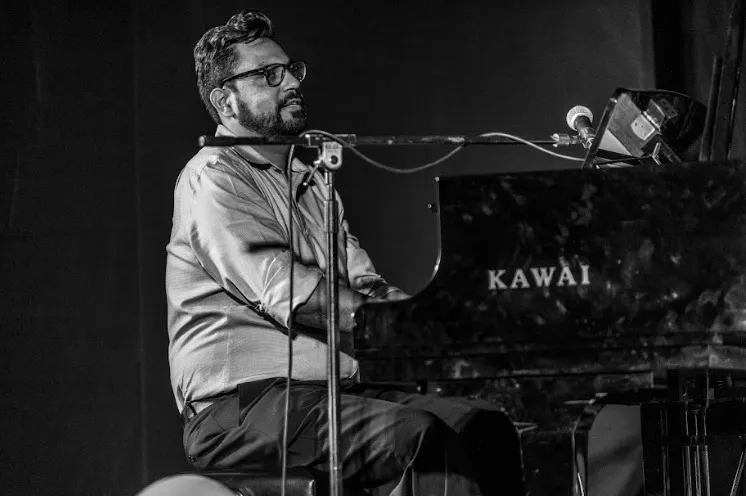
2. When you started this venture, did you envision having performers as young as the current crop?
Our first Sunday ever was a jam session. Jam sessions have been going on for 9 years here. So, it was always baked into what we intended for this establishment.
3. A lot of times, one tends to think that the access to western music performance is limited to skewed towards students from prestigious music schools. Do you think that is a thing that occurs within prestigious establishments like The Piano Man?
Not necessarily. If you go to our website, there is an “Apply to Perform” section. How we want things to function is that everyone should have the access to reach out to us, and then we go through the material. So, the reason why students from Blue Notes School of Music, or Global Music Institute might seem to be more active on the club circuit is because their access to good music education enables them to play at a higher degree of professionalism. The key here is to prove the quality of music education.
4. What do you look for in performers amidst all these applications?
We try to quantify it on the three basic verticals : there is the musicality, the stagecraft, and the theoretical music knowledge. How each of these functions is – the understanding of music is critically important, musicality is how they utilize their theoretical education in music to express themselves, and stagecraft is, because we are a performance venue, where a person is on their scale of being able to handle a stage. Stagecraft, I have seen over time, is not treated by most people in India as a separate skill to learn. It is absolutely essential for a performing artist, if you are an educator it is not necessary. We look at these three things using different methodologies. It is not necessary that you need to be unmatched in all three of these categories. We have musicians with phenomenal musical knowledge and musicality, but they just don’t know how to be on a stage and yet they are performing because they play incredible music. There are some performers who have audiences eating right out of their hands, but do not have the same degree of musicality. There may be some artists who do not have theoretical knowledge as such, but they are very gifted performers. These three factors function independently of each other.
5. Are there any recent acts by students at The Piano Man that have stayed with you or impressed you deeply?
Absolutely. In the last two months, we have done about five student concerts. We reach out to schools ourselves to request them to do their student concerts with us for multiple reasons. When there is a student concert, there are often a couple of people (sometimes me, sometimes members of my team) to see what is happening, who is the next kid coming up, etc. We also want students to experience a professional stage, so you know why you are putting this work to learn if you want to be a performing artist. It is a combination of both these factors, plus it helps us build better relationships with these schools.
Although Nishtha [Sood] is a student, they are already an excellent performing artist. As for application based / non-music school acts, there is a young band named Delhivision who did a few shows here. The saxophone player, Agneya Singh, is someone who could be put in a jazz club in New York and nobody would know. Gaurav Sharma and Shantha Tara are tremendously talented people. There are people who come from any of these schools, and some of them are prodigious.
6. Do you think there is a difference between professional, full-time musicians and student musicians?
There is a difference in mindset. When it’s your source of livelihood, it becomes a whole different ball-game. Unfortunately everyone has a different experience as a musician. There are young professionals earning amazing money, while there are phenomenal musicians in their 30s and 40s who aren’t able to make the money playing music that they love. So, there are different levels to people’s life experiences. These experiences condition your outlook to life and the way you behave as a music professional. When you are a student, you do get to live in a sort of a secure bubble.
7. In case of first-time performances by artists, is the audience accepting or positive when it comes to reception?
For most audiences, we do not tell them if they are first-time performers. If the performance is well-rehearsed, people are going to love it. The reason I do not brand them “good” or “bad” is because it is a subjective decision. At an objective-level, it is either well-rehearsed or not rehearsed. There are a lot of first-timers who put in a lot of work, and there are some with whom it is evident that they have not, in the performance. It does not matter what genre you are playing, what is important is whether you, as an artist, have put in the effort required to be on stage. Sometimes, even we are unable to assess that from submissions with the recording quality not being accurate reflections of their quality as performers. That is why we maintain our own notes — and also have the YouTube project, which we internally call the archival project. There are nearly 2000 videos on there, and we are uploading one every single day. We are recording artists performing at The Piano Man, and we have demonetised the entire channel. It should be freely accessible, and if an artist has a video up, it should be of good enough quality for them to be able to pitch ahead.
GIRJASHANKER VOHRA, DEPOT48.
1. What is your impression of student performers in general? Do they form a separate recognizable body when you look at the group of performers that you get to choose from?
Young musicians are the harbingers of music’s future, radiating a confidence and unique charisma that is thrilling. Their fluency in social media reveals a modern sensibility, and their professionalism often belies their youth. There is a fluidity to move between styles and genres that is quite fantastic. Yet, within the unpredictable terrain of the music industry, one wonders: will they endure?
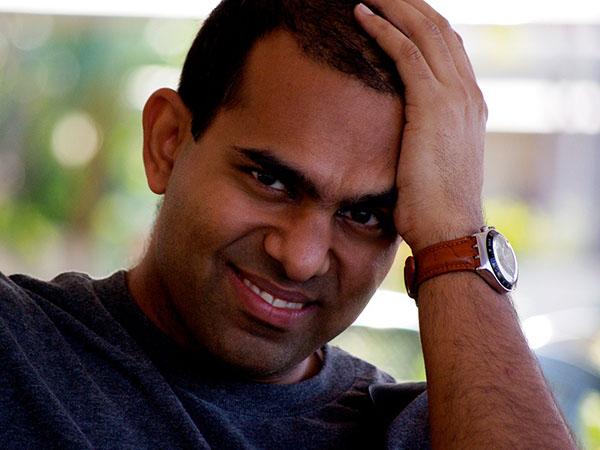
Since its inception in 2014, Depot29 (now Depot48) has been instrumental in breathing new life into the independent music scene, stepping into the void left by the closure of cherished venues like The Living Room. This renaissance has ushered a wave of young artists into the limelight, significantly shifting the demographic of performers. The rise of vibrant musicians in their early twenties heralds a promising and invigorating era for Indian independent music, suggesting a transformative future ahead.
2. What is the fundamental difference between student musicians and so-called “professional” performers that you have observed?
Experience ! The ability to anticipate situations and circumstances, enabling one to deliver the best possible outcome in any scenario. While this quality is often associated with professionalism, it stands apart. One can be highly professional yet lack the experience necessary to, for instance, accurately gauge the mood of an audience.
3. When you started out, did you envision including so many acts from this specific demographic? Was the idea to always include performers from all ages, no matter the degree of experience?
When we started, I never imagined that Delhi would be such a vibrant hub of creativity. It took just three weekends for artists, performers, and musicians to take notice of us. From that point on, there was no looking back. Initially, our stage was graced by seasoned artists, but over time, a wave of young musicians emerged. These were either visiting from music schools or being taught by local institutions and other artists, steadily pouring into the scene.
4. What do you primarily look for while selecting performers? Is there something specific, some quality, some qualification that acts as a filtration process?
One instinctively recognizes when someone has a spark. It emanates not just from their singing or playing but from their entire being. This, combined with strong writing and composition, forms the core of my selection criteria. Production quality, on the other hand, is less crucial. Having worked as a sound designer for the past 25 years, I understand that production can be hit or miss. I often find myself pondering: is there poetry in this music? Is there an ineffable quality in this performer? That’s the one !
5. What are some of your favorite acts when it comes to student performers? Have there been any that have caught your eye?
The level of music instruction has over the last 10 years seen a huge jump and schools such as the Swarnabhoomi Academy of Music, GMI, Blue Notes School, and individual teachers like Situ Singh Buehler, Amyt Datta, Sentirenla Lucia, Nishad Pandey, Aman Mahajan, Akash Vincent, Abhishek Mittal, have to be applauded for instilling not only good music education but also good ethics and professionalism.
There is such a diversity and range of musicians that it might be hard to pin down a few but Ahmad Parvez, Junaid Ahmed, IMON, JAHNVI are a few that come to mind.
6. The Piano Man, for example, extends invitations to music schools. Is there any similar arrangement that Depot 48 goes for? If not, do you extend invites to specific performers / groups of performers ?
As an established performance space, we have been fortunate to host students from music schools across the subcontinent, as well as from esteemed institutions like AFTRS in New South Wales and Oberlin Conservatory of Music in Ohio, many from Berklee and Codarts in Amsterdam. The most exciting aspect is the intermingling of musicians with diverse influences, coming together to create something entirely new and exhilarating.
Additionally, many music schools based in Delhi and Noida hold their junior and senior recitals with us, offering audiences a rich and varied musical experience to immerse themselves in.
7. How do artists apply to perform at Depot 48?
All our social media platforms are highly active, and while performers and musicians often reach out there, I encourage everyone to use our dedicated email address for curation and performance inquiries: [email protected].
These interviews scratch the surface of the workings of Delhi’s music scene, and in no way form an all-inclusive comprehensive documentation of the semantics of an entire city’s musical landscape, even when narrowed down to the student niche. However, these extremely interesting, hard-working, beautiful individuals took their time and entrusted me with some of it to understand everything a little better and I hope this compilation of conversations communicates the same kind of knowledge that was to me, to everyone who invests themselves even fractionally into this report.
Featured Image is a picture of The Piano Man, Gurugram, from Architectural Digest, edited by Saptaparna Samajdar.






